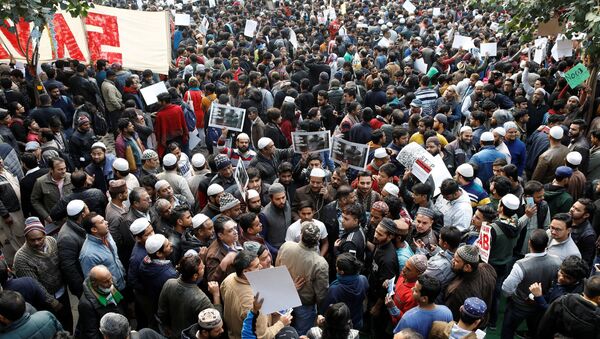Protests in the Indian capital of New Delhi are continuing for a third day in a row, with major clashes between demonstrators and police, the Hindustan Times reported.
As demonstrators continue to protest against the new citizenship law, buses have been torched, as well as cars and bikes smashed, reports say.
— Sputnik (@SputnikInt) December 15, 2019
Delhi Traffic Police said in a statement that an area from the Okhla Underpass to Sarita Vihar Street had been closed due to the demonstrations. Students were reportedly asking the mob not to damage cars or burn buses when a group of people was clashing with law enforcement.
"Congress and their allies are creating a ruckus. They are doing arson because they did not get their way. Those who are creating violence can be identified by their clothes itself", Indian Prime Minister Narendra Modi stated in Dumka, Jharkhand as quoted by ANI news agency.
According to the prime minister, both houses of parliament passed the law in order "to give respect to those who fled to India and were forced to live as refugees".
— Sputnik (@SputnikInt) December 15, 2019
Photos and videos of the protests have been published on social media platforms.
— C T Ravi 🇮🇳 ಸಿ ಟಿ ರವಿ (@CTRavi_BJP) December 15, 2019
— Vaishali Gupta (@GurlAmbitions) December 15, 2019
#WATCH Aligarh: Police fire tear gas shells at protesters outside Aligarh Muslim University campus after protesters pelted stones at them. (Note: abusive language) #CitizenshipAmendmentAct pic.twitter.com/lUiXJUtkRx
— ANI UP (@ANINewsUP) December 15, 2019
Earlier this week, the Indian parliament passed a bill fast-tracking citizenship to Hindus, Sikhs, Buddhists, Jains, Parsis, and Christians fleeing persecution in Afghanistan, Bangladesh, and Pakistan and who have been residents since before 2014. Muslims are reportedly not given the same opportunity. Opponents of the bill call it discriminatory, and critics say that it is a fresh attempt to side-line the nearly 200-million-strong Muslim minority.
After the bill was passed, several thousand people took to the streets and blocked roads to protest the controversial bill. While law enforcers were trying to clear roads, protesters were throwing stones at them, forcing the latter to use tear gas and rubber bullets.




